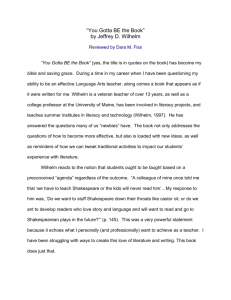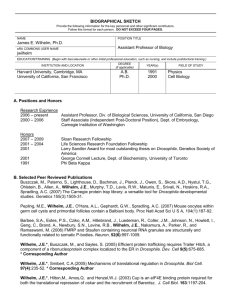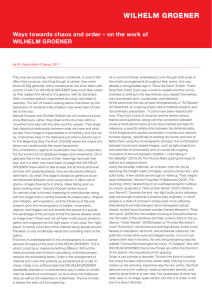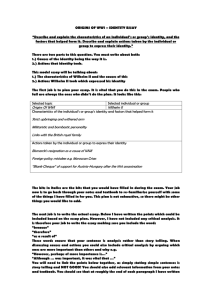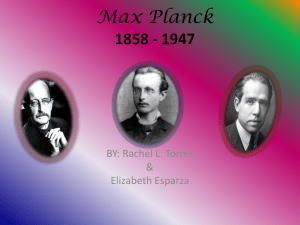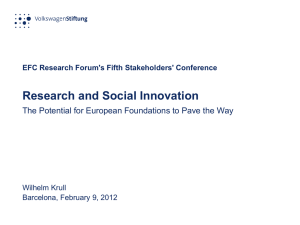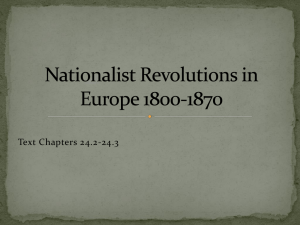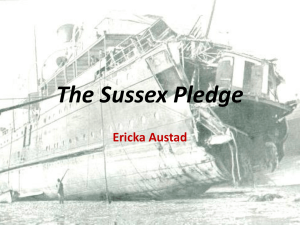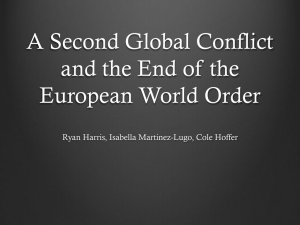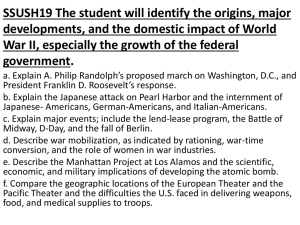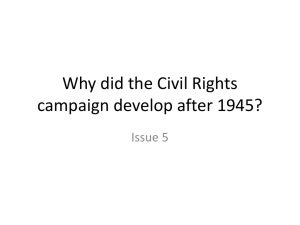Saul Bellow - Ms. West
advertisement
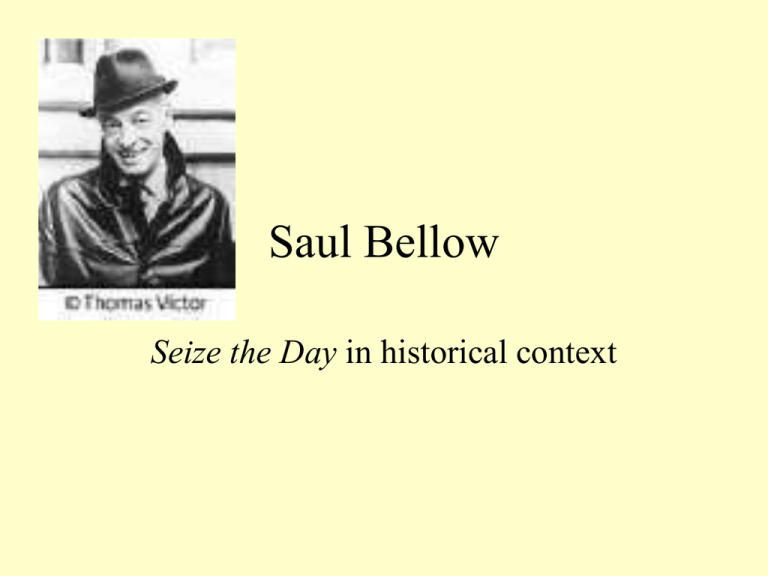
Saul Bellow Seize the Day in historical context Post WWII • US emerged from WWII as the most powerful nation on earth • People wanted life to return to normal, but the dawn of the nuclear age and fear of the Soviet Union worried everyone • UN created at the same time the Cold War starts between the US and Soviet Union • Conflict in S. Korea to fight Communism there in 1950 • Americans of the 1950’s called the “silent generation” – lived through the Great Depression and WWII, so when peace and prosperity arrived, only too happy to adopt a quiet complacent attitude • American life was growing more diversified and complex • Rapid change: technology, travel… • Literature reflects the feelings and changes taking place at this time: struggle of ordinary people in a complex world and their desire to improve their lives Saul Bellow • Writes about the average man seeking truth in a world that overwhelms him…Why? • Born Solomon Bellows in Lachine, Canada, 1915 • Moved to Chicago in 1924 and the city became his “frontier” • Seize the Day is set in NY where Bellow captures the world in which the main character navigates • As a Jewish-American writer in the post WWII era, Bellow imbues his novels with rich Jewish heritage without steeping them in orthodox ritual • Bellow takes on big themes without “sermonizing” • His novels reflect a vast array of influences, from Nietzsche to Mark Twain • His work is deeply intellectual with characters who are often themselves intellectuals • Bellow is considered one of the great American authors of the 20th century for his insight into human suffering and relationships • For his skill, he was awarded the Nobel Prize for Literature in 1976 • Also awarded the Pulitzer Prize and won the National Book Award three times • In a recent list of the 100 best works of fiction in this century, two of Bellow’s books made the grade Bellow’s Techniques • Bellow was interested in theatre, so many theatrical techniques appear in Seize the Day and in his only full length play, The Last Analysis • Seize the Day: – Tommy Wilhelm an ex-actor – Acting/theatre as an escape: “When you start to act, you’re no more an ordinary person” (p. 22) – Characters in theatre “feel” more than “normal” people (Wilhelm) – Dramatic flow – Seize the Day designed as a “sequence of instants” – the notion of “instantaneousness” Structurally, the story is surrounded by an aura of the ordinary, even decay… – The Gloriana Hotel – aging hotel for aging people – Dr. Adler, patriarch of the family, is well-off, at least in theory – A son, Tommy, who is financially demanding – Approaching death of Dr. Adler – Lack of emotional involvement on the part of Dr. Adler Treatment of Women… • Often vampire-like, money-hungry, leeches • Margaret (Wilhelm’s wife) “knows how to cripple by sickening a man with guilt…” • Hear little of Wilhelm’s sister, Catherine, except that she tries to get money for a gallery showing from her father, Dr. Adler Burdens of the Past… • Tommy Wilhelm spends much of the day alternately agonizing over and avoiding past mistakes • Looking for rebirth Bellow’s Legacy… • In spite of all his success, Saul Bellow remains an undiscovered master. Few people can name many of his titles. Fewer, still, have read him. • So what is the secret to his success as a writer? “He is that rare author who combines imaginative storytelling with vast intellectual knowledge, as well as a moral conscience.” Top 10 Quotes from Seize the Day: • 1. “Old people are bound to change, he said. They have hard things to think about. They must prepare for where they are going.” p. 15 (Fawcett edition, 1956). • 2. “‘. . . love that well which thou must leave ere long.’” p. 16 • 3. “It was getting so that people were feebleminded about everything except money. p. 41 • 4. “Carry nobody on your back.” p. 61 • 5. “Ass! Idiot! Wild boar! Dumb mule! Slave! Lousy, wallowing hippopotamus!” p. 62 • 6. “Money-making is aggression. That’s the whole thing. . . . people come to the market to kill. They say, ‘I’m going to make a killing.’” p. 76 • 7. “Every other man spoke a language entirely his own, which he had figured out by private thinking; he had his own ideas and peculiar ways.” p. 91 • 8. “Nature only knows one thing, and that’s the present. Present, present, eternal present, like a big, huge, giant wave— colossal, bright and beautiful, full of life and death, climbing into the sky, standing in the seas.” p. 97 • 9. “You can spend the entire second half of your life recovering from the mistakes of the first half.” p. 100 • 10. “I want to tell you, don’t marry suffering. Some people do. They get married to it, and sleep and eat together, just as husband and wife. If they go with joy they think it’s adultery.” p. 106 Top 10 Quotes from Seize the Day: • 1. “Old people are bound to change, he said. They have hard things to think about. They must prepare for where they are going.” p. 15 (Fawcett edition, 1956). Wilhelm tries to make excuses for his father. • 2. “‘. . . love that well which thou must leave ere long.’” p. 16 Wilhelm recalls a snatch of poetry (by Shakespeare) from his college days. • 3. “It was getting so that people were feebleminded about everything except money. p. 41 Wilhelm’s thoughts as he sits with his father and Mr. Perls at breakfast. • 4. “Carry nobody on your back.” p. 61 Dr. Adler’s advice to his son. • 5. “Ass! Idiot! Wild boar! Dumb mule! Slave! Lousy, wallowing hippopotamus!” p. 62 The names Wilhelm calls himself after he leaves the breakfast table. • 6. “Money-making is aggression. That’s the whole thing. . . . people come to the market to kill. They say, ‘I’m going to make a killing.’” p. 76 Dr. Tamkin speaks to Wilhelm. • 7. “Every other man spoke a language entirely his own, which he had figured out by private thinking; he had his own ideas and peculiar ways.” p. 91 Wilhelm’s thoughts about New York. • 8. “Nature only knows one thing, and that’s the present. Present, present, eternal present, like a big, huge, giant wave—colossal, bright and beautiful, full of life and death, climbing into the sky, standing in the seas.” p. 97 Dr. Tamkin explains his philosophy of living in the present. • 9. “You can spend the entire second half of your life recovering from the mistakes of the first half.” p. 100 Wilhelm to Dr. Tamkin. • 10. “I want to tell you, don’t marry suffering. Some people do. They get married to it, and sleep and eat together, just as husband and wife. If they go with joy they think it’s adultery.” p. 106 Dr. Tamkin’s advice to Wilhelm.
